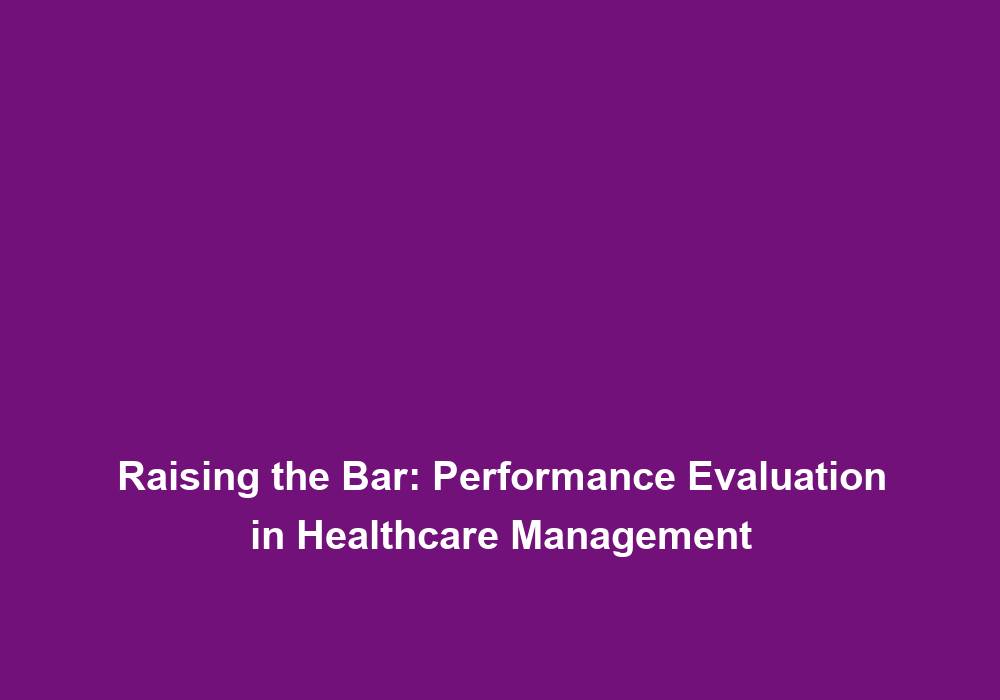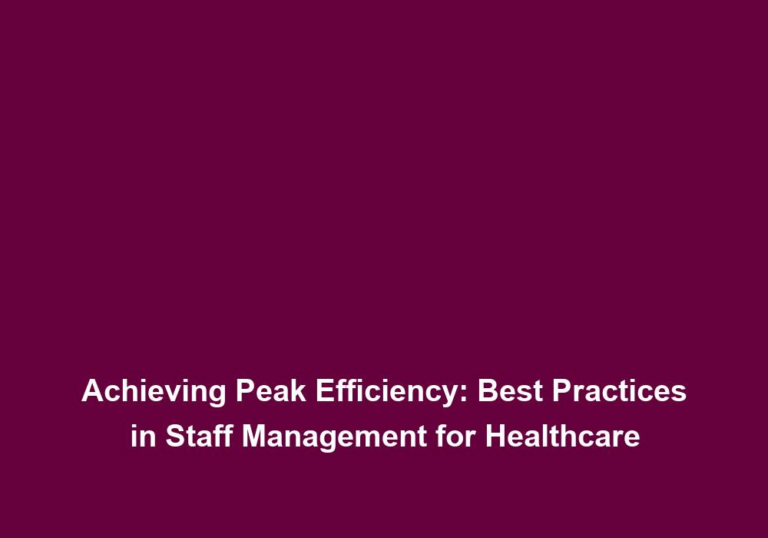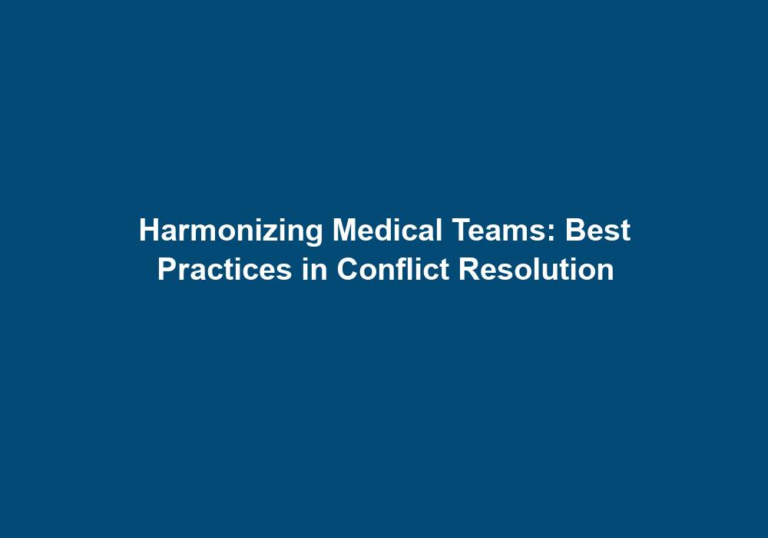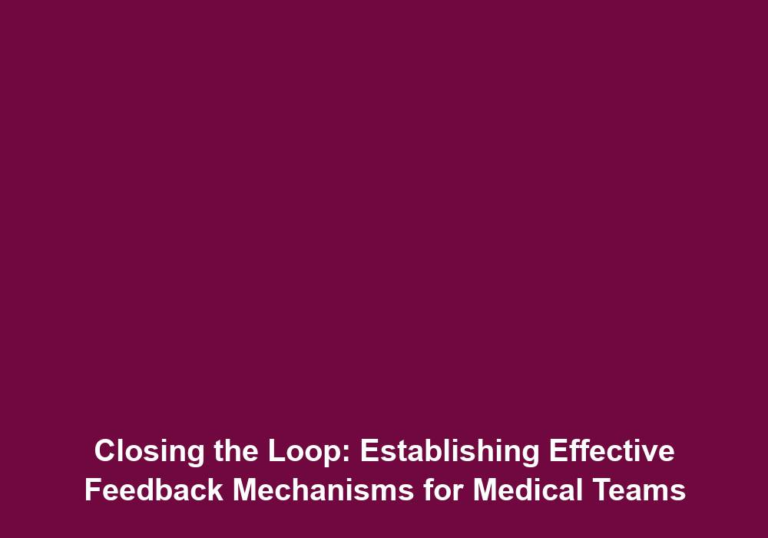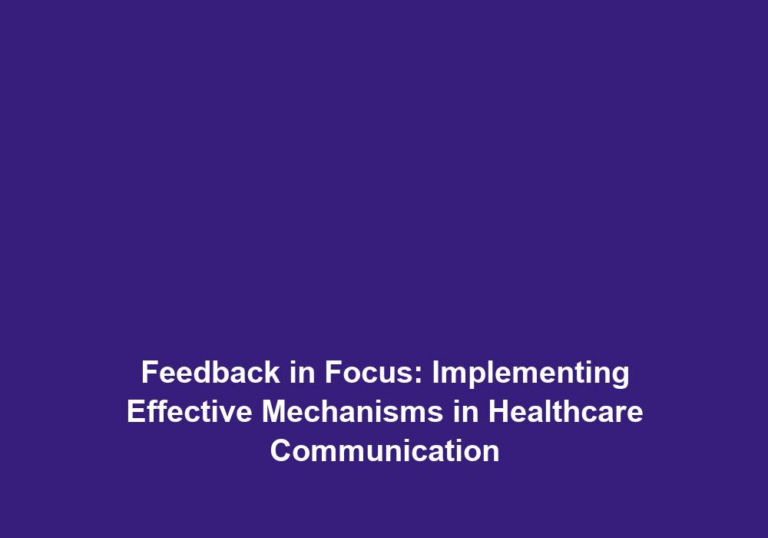Raising the Bar: Performance Evaluation in Healthcare Management
In the healthcare industry, performance evaluation plays a crucial role in improving the quality of care provided to patients, enhancing operational efficiency, and ultimately contributing to better patient outcomes. This article will delve into the significance of performance evaluation in healthcare management and explore various strategies and tools that can be employed to ensure its successful implementation.
The Importance of Performance Evaluation in Healthcare Management
Performance evaluation serves as a valuable tool for healthcare organizations to assess their overall effectiveness and identify areas for improvement. Let’s take a closer look at some key reasons why performance evaluation is vital in healthcare management:
1. Enhancing Patient Care and Outcomes
At the heart of any healthcare organization lies the primary objective of delivering superior patient care and improving health outcomes. Performance evaluation plays a crucial role in monitoring and measuring the quality of care provided to patients. By identifying gaps in care delivery, healthcare managers can develop targeted interventions and strategies to bridge these gaps, resulting in improved patient outcomes.
Performance evaluation can help healthcare organizations:
- Identify areas where patient care may be lacking or falling short of expectations.
- Measure patient satisfaction to understand their experiences and identify areas for improvement.
- Track important metrics such as readmission rates, infection rates, and medication errors to identify trends and implement interventions.
- Implement evidence-based practices to enhance the quality of care and improve patient outcomes.
2. Ensuring Compliance with Standards and Regulations
Healthcare organizations must adhere to a multitude of standards and regulations to ensure the safety and well-being of patients. Performance evaluation helps in assessing an organization’s compliance with these standards and identifying areas where improvements are needed. By regularly evaluating performance, healthcare managers can ensure that their organization operates within the boundaries of both legal and ethical frameworks.
Performance evaluation can assist healthcare organizations in:
- Identifying areas of non-compliance with standards and regulations.
- Implementing corrective actions to address non-compliance and ensure adherence to best practices.
- Monitoring the effectiveness of compliance training programs and identifying areas for improvement.
- Demonstrating accountability and transparency to regulatory bodies and stakeholders.
3. Identifying Operational Inefficiencies
Inefficient operational processes not only hinder the delivery of quality care but also contribute to increased costs. Performance evaluation enables healthcare managers to identify areas of inefficiency within their organization, such as long wait times, excessive paperwork, or bottlenecks in workflows. By addressing these inefficiencies, healthcare organizations can streamline their operations, increase productivity, and reduce costs, ultimately leading to improved financial performance.
Performance evaluation can help healthcare organizations:
- Identify bottlenecks and inefficiencies in workflows and processes.
- Streamline operations and eliminate unnecessary steps or redundancies.
- Improve resource allocation and utilization, leading to cost savings.
- Enhance the overall efficiency and productivity of the organization.
4. Fostering a Culture of Continuous Improvement
Performance evaluation serves as a catalyst for continuous improvement in healthcare organizations. By regularly assessing performance, healthcare managers can identify opportunities for growth and implement strategies to enhance the overall performance of their organization. This fosters a culture of continuous improvement, where employees are encouraged to seek innovative solutions, embrace change, and strive for excellence in their respective roles.
Performance evaluation can contribute to a culture of continuous improvement by:
- Encouraging open and transparent communication between managers and employees.
- Recognizing and rewarding exceptional achievements.
- Identifying training and development needs to enhance employee skills and knowledge.
- Promoting a proactive approach to problem-solving and innovation.
Strategies for Successful Performance Evaluation in Healthcare Management
Implementing an effective performance evaluation system requires careful planning and execution. Here are some strategies that healthcare managers can consider:
1. Clearly Defined Goals and Metrics
To evaluate performance accurately, it is essential to establish clear and measurable goals. These goals should align with the organization’s mission and vision, as well as specific departmental objectives. Metrics should be developed to track progress towards these goals and provide quantifiable data for performance evaluation. Examples of metrics include patient satisfaction scores, readmission rates, infection rates, and employee productivity.
By setting clear goals and metrics, healthcare managers can:
- Provide a clear direction and focus for employees.
- Monitor progress towards organizational objectives.
- Identify areas of strength and areas that require improvement.
- Measure the impact of interventions and initiatives.
2. Regular Performance Reviews
Regular performance reviews are essential for monitoring progress, providing feedback, and identifying areas for improvement. These reviews should be conducted on a predetermined schedule and involve both supervisors and employees. By engaging in constructive discussions, healthcare managers can not only address any performance issues but also recognize and reward exceptional achievements. Performance reviews should be documented to ensure accountability and serve as a reference for future evaluations.
Regular performance reviews can:
- Facilitate open and honest communication between managers and employees.
- Provide an opportunity for employees to receive feedback and clarify expectations.
- Identify areas for improvement and create development plans.
- Recognize and reward exceptional performance, fostering motivation and engagement.
3. Training and Development Opportunities
Performance evaluation should not be perceived as a punitive measure but rather as an opportunity for growth and development. Healthcare organizations should invest in ongoing training and development programs to enhance the knowledge and skills of their employees. By providing access to relevant educational resources and professional development opportunities, healthcare managers can empower their workforce to perform at their best and contribute to organizational success.
Investing in training and development can:
- Enhance employee skills and knowledge, leading to improved performance.
- Foster a culture of learning and continuous professional development.
- Address skill gaps and promote career advancement opportunities.
- Improve employee satisfaction and retention.
4. Utilizing Technology and Data Analytics
Leveraging technology and data analytics can significantly enhance the effectiveness of performance evaluation in healthcare management. Electronic health records (EHRs), for instance, can provide valuable insights into patient outcomes, medication errors, and other critical data points. Advanced analytics tools can analyze this data to identify trends, patterns, and areas for improvement. By harnessing the power of technology, healthcare managers can make data-driven decisions and continuously monitor performance metrics.
By utilizing technology and data analytics, healthcare managers can:
- Access real-time data for performance evaluation.
- Identify patterns and trends to inform decision-making.
- Monitor key performance indicators and track progress towards goals.
- Implement evidence-based practices and interventions.
Conclusion
Performance evaluation is a fundamental component of healthcare management that enables organizations to raise the bar and deliver exceptional patient care. By focusing on enhancing patient outcomes, ensuring compliance, identifying operational inefficiencies, and fostering a culture of continuous improvement, healthcare managers can drive positive change within their organizations. By implementing clear goals and metrics, conducting regular performance reviews, investing in training and development, and leveraging technology and data analytics, performance evaluation can become a powerful tool for achieving excellence in healthcare management.

